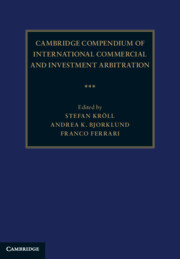Book contents
- Cambridge Compendium of International Commercial and Investment Arbitration
- Cambridge Compendium of International Commercial and Investment Arbitration
- Copyright page
- Contents
- Figures
- Tables
- Contributors
- Preface
- Part I Foundations
- Part II Public Law Questions Relating to Arbitration
- Part III Stakeholders in Arbitration
- Part IV Applicable Law
- Part V Jurisdiction of the Arbitrator
- 23 The Arbitration Agreement: Legal Nature, the Contractual and the Jurisdictional Aspect
- 24 The Various Forms of ‘Consent’ in International Arbitration
- 25 Protecting and Challenging the Arbitrator’s Jurisdiction
- 26 The Competence-Competence Principle’s Positive Effect
- 27 The Competence-Competence Principle’s Negative Effect
- 28 The ‘Separability’ of the Agreement to Arbitrate
- 29 Admissibility versus Jurisdiction
- 30 Settlement Efforts and Contract Adaptation by Arbitral Tribunals
- Part VI The Arbitral Tribunal
- Part VII Procedural Questions in Arbitration
- Part VIII Role of State Courts in Arbitration
- Part IX Awards
- Part X Post-Award Issues
- Part XI Legal Concepts
- Part XII Areas of Concern
- Part XIII Arbitration and Related Fields
- Part XIV EU Law and Arbitration
28 - The ‘Separability’ of the Agreement to Arbitrate
from Part V - Jurisdiction of the Arbitrator
Published online by Cambridge University Press: 18 February 2023
- Cambridge Compendium of International Commercial and Investment Arbitration
- Cambridge Compendium of International Commercial and Investment Arbitration
- Copyright page
- Contents
- Figures
- Tables
- Contributors
- Preface
- Part I Foundations
- Part II Public Law Questions Relating to Arbitration
- Part III Stakeholders in Arbitration
- Part IV Applicable Law
- Part V Jurisdiction of the Arbitrator
- 23 The Arbitration Agreement: Legal Nature, the Contractual and the Jurisdictional Aspect
- 24 The Various Forms of ‘Consent’ in International Arbitration
- 25 Protecting and Challenging the Arbitrator’s Jurisdiction
- 26 The Competence-Competence Principle’s Positive Effect
- 27 The Competence-Competence Principle’s Negative Effect
- 28 The ‘Separability’ of the Agreement to Arbitrate
- 29 Admissibility versus Jurisdiction
- 30 Settlement Efforts and Contract Adaptation by Arbitral Tribunals
- Part VI The Arbitral Tribunal
- Part VII Procedural Questions in Arbitration
- Part VIII Role of State Courts in Arbitration
- Part IX Awards
- Part X Post-Award Issues
- Part XI Legal Concepts
- Part XII Areas of Concern
- Part XIII Arbitration and Related Fields
- Part XIV EU Law and Arbitration
Summary
The notion of a “separable” arbitration agreement--- presuming that the validity and ambit of an arbitration clause are to be judged independently from that of the overall contract between the parties---is the cornerstone of the arbitration law of virtually every state. Such a rule functions to protect the agreement to arbitrate from assertions (often raised in bad faith and for purposes of delay) that the overall agreement is subject to some infirmity that necessarily “taints” the submission to arbitration as well; the impact of the rule is that such assertions fall to be decided, not by courts, but by the arbitral tribunal itself.Despite frequent objections that this allocation of authority is not “logical”---that every part of a contract must stand or fall together---the rule of “separability” is best understood as a sensible default rule respecting the probable expectation of contracting parties (who were unlikely to have contemplated that a claim, say, of fraud, and a claim going to the merits of a cause of action, would fall to be adjudicated by different decisionmakers). Application of “separability” grounded in challenges based on fraud is in fact entirely intuitive; other sorts of challenges (perhaps suggesting a failure of any consensus whatever between the parties) may be more difficult.Still, the fil conducteur is clear enough, and jurisprudence across national lines remarkably consistent.
Keywords
- Type
- Chapter
- Information
- Publisher: Cambridge University PressPrint publication year: 2023



